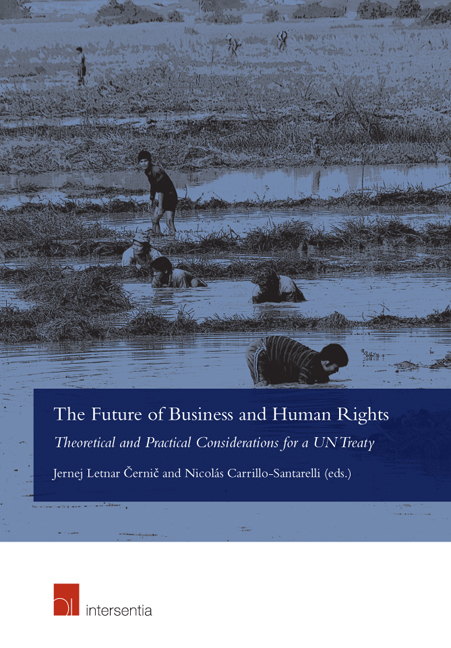Book contents
- Frontmatter
- Dedication
- Acknowledgements
- Contents
- About the Contributors
- Introduction
- Part I The Convenience and Possibility of Adopting a Treaty on Business and Human Rights
- Alternative Paths to a Business and Human Rights Treaty
- A Defence of Direct International Human Rights Obligations of (All) Corporations
- A Treaty on Business and Human Rights: Problems and Prospects
- Part II Critical Analyses Of A Treaty On Business And Human Rights
- Part III Regional Approaches
- PART IV Lessons from other Regimes of International Law
- Conclusion
- Index
Alternative Paths to a Business and Human Rights Treaty
from Part I - The Convenience and Possibility of Adopting a Treaty on Business and Human Rights
Published online by Cambridge University Press: 11 October 2018
- Frontmatter
- Dedication
- Acknowledgements
- Contents
- About the Contributors
- Introduction
- Part I The Convenience and Possibility of Adopting a Treaty on Business and Human Rights
- Alternative Paths to a Business and Human Rights Treaty
- A Defence of Direct International Human Rights Obligations of (All) Corporations
- A Treaty on Business and Human Rights: Problems and Prospects
- Part II Critical Analyses Of A Treaty On Business And Human Rights
- Part III Regional Approaches
- PART IV Lessons from other Regimes of International Law
- Conclusion
- Index
Summary
INTRODUCTION
Despite significant opposition from developed countries, the United Nations (UN) Human Rights Council in June 2014 adopted Resolution 26/9 to establish an open-ended intergovernmental working group (OEIGWG) with a mandate ‘to elaborate an international legally binding instrument to regulate, in international human rights law, the activities of transnational corporations and other business enterprises’. The mandate of the OEIGWG ‘shall be to elaborate an international legally binding instrument to regulate, in international human rights law, the activities of transnational corporations and other business enterprises’. The first two sessions of the OEIGWG were to be ‘dedicated to conducting constructive deliberations on the content, scope, nature and form of the future international instrument’. The OEIGWG held its first session in July 2015 in Geneva, and the second session in October 2016.
Out of several themes that emerged from the first session of the OEIGWG, the one thing which stood out was that developed countries – where most of the transnational corporations (TNCs) have been incorporated historically – did not want to see any binding international rules in the business and human rights (BHR) field, despite their full support for the corporate responsibility to respect human rights under the Guiding Principles on Business and Human Rights (GPs). Most of these countries did not participate in the first session or boycotted it after the first day. The developed countries – non-participation in the first sessions, as well as their general opposition to the current treaty process, embodies several strands: that the ‘footnote’ of Resolution 26/9 arbitrarily excludes local/domestic companies from the purview of the treaty; that a discussion about the treaty will break the consensus built by the adoption of the GPs; and that the treaty discussion will divert attention from implementing the GPs through national action plans or otherwise.
The European Union and some other developed countries participated in the second session of the OEIGWG held in October 2016 only after a ‘footnote’ in the programme of work provided that the discussions in the session ‘can include TNCs as well as all other business enterprises’. This participation was, however, mostly symbolic and superficial, rather than the sign of a deep engagement with, or support for, the current treaty process.
- Type
- Chapter
- Information
- The Future of Business and Human RightsTheoretical and Practical Considerations for a UN Treaty, pp. 13 - 32Publisher: IntersentiaPrint publication year: 2018

